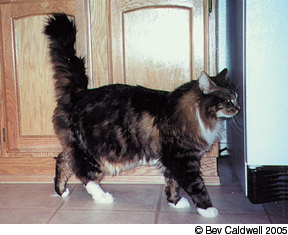Our cat Gracie Allen appeared normal as a kitten, says Stefanie Schwartz, DVM, except that she seemed unusually calm for a kitten. She didnt explore a lot and wasnt especially playful. Then when she was about four or five months old, she started bumping into things. Thats when we brought her to a veterinary ophthalmologist and my suspicions were confirmed. Dr. Schwartz is director of behavior services at the VCA South Shore Animal Hospital in Weymouth, Massachusetts.
Gracie, a long-haired calico now eight years old, was blind from congenital retinal atrophy – an eye disease in which the retina is dysfunctional. She must have had some vision in the beginning that deteriorated from birth onwards, says Dr. Schwartz, author of Dr. Cookies Guide to Living Happily Ever After with Your Cat.
The idea of going blind is terrifying to most of us. Besides the practical problems involved, it represents a severe loss of independence. But when cats go blind, they seem to have an easier time adjusting than humans. And once they begin relying more on their other senses of smell and hearing, they can learn to manage exceedingly well.
A blind cat, if well cared for, can live a full lifespan, and blindness will not prevent her from being a wonderful companion. Gracie is extremely affectionate, says Dr. Schwartz, who is board-certified by the American College of Veterinary Behaviorists. In fact, she feels most secure when being held.
The Onset of Blindness
Blindness can occur from a variety of conditions. Some of the most common causes are untreated viral, bacterial or parasite infections, says Dr. Schwartz. Glaucoma is another cause of blindness, as are retinal diseases, congenital conditions and trauma to the eye.

288
Generally, how quickly your cat becomes blind affects her initial adjustment. Depending on the cause of blindness, your cat may lose some or all of her sight. If the vision loss is gradual, your cat should adjust well, a bit at a time. However, if blindness occurs suddenly, there is usually a panic phase that may last several weeks. Your cat may be fearful, bang into things or huddle along the walls of your house. In multi-cat or multi-pet families, your blind cat may initially have some trouble getting along with the other animals. Full adjustment – which consists of trial and error as your cat explores her home environment while being blind – may take a number of months, according to Dr. Schwartz.
As your blind cat becomes accustomed to the loss of sight, she will need you more than ever to comfort and protect her in her surroundings.
Keep Your Cat Safe and Secure
The main thing in helping your cat adjust to blindness is to make the environment as safe, stable and calm as possible. Even if your cat was an outside cat, blindness makes it necessary to keep her inside now.
Start your cat off in one room that she is familiar with, says Dr. Schwartz. Place her food and litter box in this room and visit her there often. Then when she seems to adjust to this room, you can start letting her into the other rooms of the house.
Try to keep your furniture in the same location in your home. If you keep your cats food and litter box in the same place, your cat should have no problem remembering; she will be relying on her sense of smell to guide her.
You absolutely must pet-proof your home when your cat is blind, says Dr. Schwartz, particularly during the adjustment phase. Close basement doors, put up gates in front of steep stairs, screen in windows and eliminate any object that could be an obstacle.
Keep the stress level down by avoiding sudden movements or loud noises around your blind cat. Ask visitors to speak to and approach your cat gently.
Homes with more than one animal may at first pose a real challenge for a blind cat. Your blind cat will miss the visual cues – such as facial expressions and body posture – that compose much of communication between animals, says Dr. Schwartz. As a result, your cat may get in the way of other felines in the household and there may be some spats.
I suggest having every cat in the household wear a bell so that your cat will have additional cues to know when another feline is around.
By providing your cat with understanding, patience and love, you may be surprised at how well she adjusts to life again as your companion.



